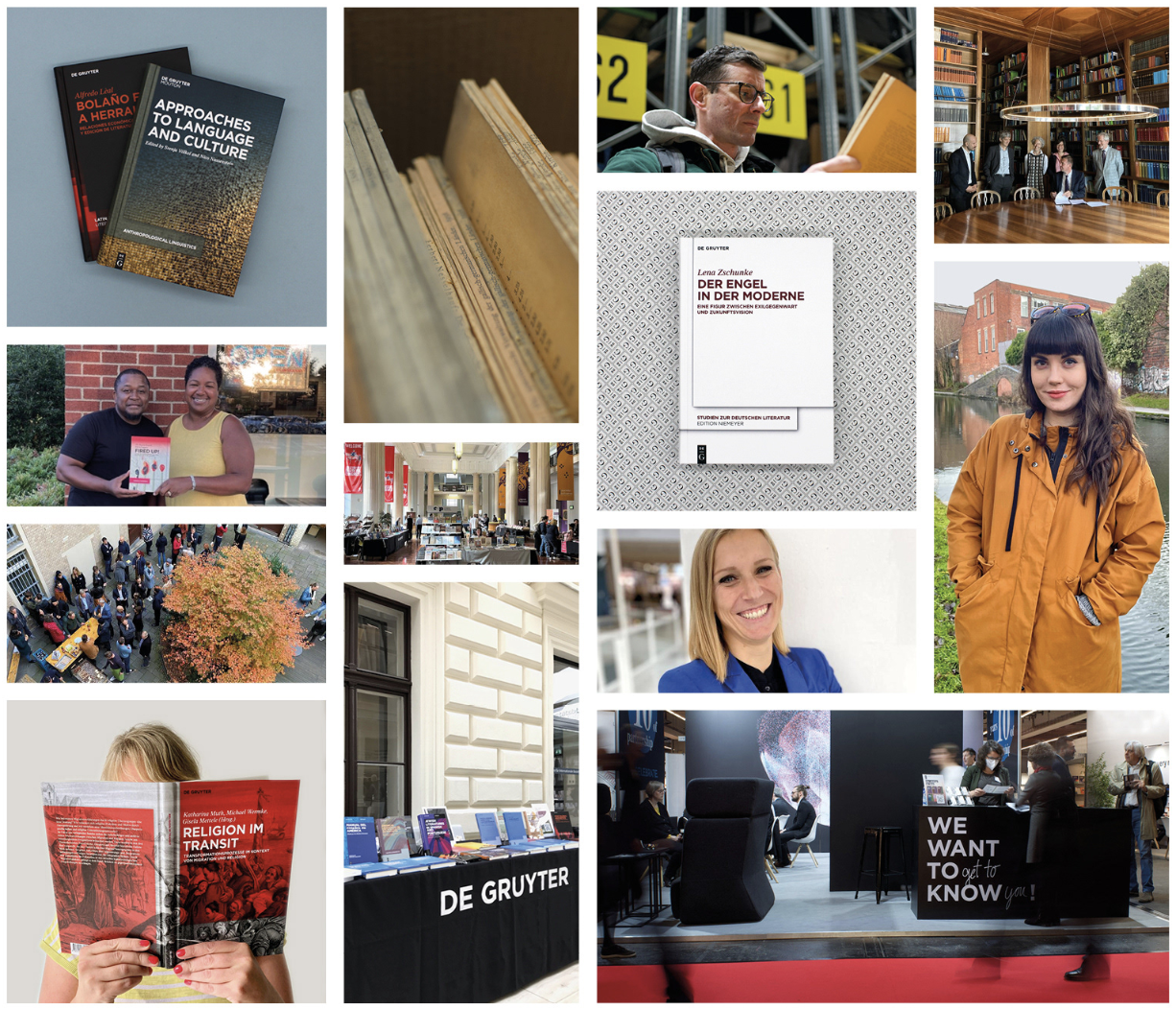Welcome to our branding guidelines for social media. They are intended for De Gruyter employees who are active on social media or who plan to be.
We encourage you to use social media in ways that benefit De Gruyter. Whether you post as a De Gruyter employee from your private profile or from an official De Gruyter account, make sure to use common sense and sound judgment. Keep in mind our values and adhere to the Social Media Code of Conduct (see below) and the General Data Protection Regulation (GDPR).
And don’t forget: social media is about images and videos as much as it is about words.
Design
Visual concept
Generally, posts with appealing images attract more attention – from users as well as algorithms. Whenever possible, pictures on social media should convey a feeling of authenticity and likeability. They should emphasize De Gruyter’s commitment to respecting diversity across all ages, genders, cultural backgrounds and ethnicities. When you post images, please also make sure they comply with our corporate design guidelines. Information on image rights can be found in the process map on Walter.
Image sizes
In general, we use landscape format for posts on Facebook, Twitter and LinkedIn; square images for the Instagram feed; and portrait mode for Instagram Stories and Reels. Size specifications change quite often on social media platforms, so please check Sprout Social for any updates. We use the following standard formats:
Facebook, Twitter, LinkedIn:
Shared image or links in landscape: 1200 x 620 px
Instagram:
Photos in square format: 1080 x 1080 px
Stories and Reels in portrait format: 1080 x 1920 px
Logos & URLs
There’s no need to include the De Gruyter logo in every social media post, but the option is there. If you do use our logo, keep in mind that its size, proportions and placement must follow the official template. In general, URLs should be placed not in the images themselves, but in the corresponding post, so users can click to and follow the link.
Templates for organic posts
You’ll find templates for a number of standard organic posts in our account on Canva. For login information, please contact design@degruyter.com.
When posting book covers, please use the high resolution version. Events should be announced on all social media channels. Once you have decided on a design, stick with it for all platforms.
Campaigns & paid ads
Campaigns, paid ads and boosted posts can be designed individually. Paid advertising campaigns are usually set up by Marketing in cooperation with Design.
Best practice examples
If possible, we recommend using photographs in posts (rather than generic visuals) to ensure clarity, credibility and authenticity. Ideally, pictures should feature people (not just books and booths) in order to appeal to our audience on a personal and emotional level. You can find more best practice examples on our case study website Behance.

Header Images
Header images should visually complement the subject area and provide an introduction to the topic. Abstract motifs that leave room for interpretation are also possible. Videos can be used as long as they represent the academic discipline in question. For all De Gruyter accounts, use the De Gruyter logo as the profile image and an image with no added text as the cover image.

Voice and Tone
Like a person, De Gruyter always speaks with the same voice. Our tone, by contrast, can change depending on the recipient and the situation.
The tone we use on social media can be more informal and fun than traditional channels of communication. Think of how you would talk to a client, partner or academic peer in a face-to-face conversation. Let your sense of humor shine through. It’s fine to use an emoji or a GIF here and there.
The way we speak on social media should accord with that of the scholarly community. While clarity should be the priority, specialist language may be used when appropriate.
Social Media Code of Conduct
This Code of Conduct governs all social media activities at De Gruyter, whether you run an official De Gruyter account or post information about the publishing house on your private profile.
Transparency:
On social media, the difference between professional and private communication isn’t always clear-cut. Even when you are communicating as an individual, people may perceive you to be speaking on behalf of De Gruyter. When posting as a private person online it’s vital that others understand that you do not speak for the company. You can ensure this by writing in the first person and/or adding a disclaimer to your post or profile (e.g., “These opinions are my own and do not necessarily represent the views of De Gruyter”).
Responsibility:
Remember that you are personally responsible for everything you post online – and the internet seldom forgets. The content you post will be able to be read, copied and shared for years to come. Refrain from posting anything that could potentially harm your reputation or that of the company. Think about the consequences before you post.
Confidentiality:
Most conversations on social media are public. Some of the information circulating in our company is not. Never publicly disclose privileged or confidential De Gruyter information such as sales data, finances, strategies and unpublished technology. Before posting images or text concerning co-workers, authors, customers, partners, etc., please make sure you have their permission first.
Copyright law:
Each social network has copyright rules that are specified in the general terms and conditions. When posting adhere to those rules and to the ones defined in the General Data Protection Regulation (GDPR). Make sure you have permission to post images or use personal data, copyrighted materials, trademarks, service marks or other intellectual property before you publish. As a rule: if it’s not yours, don’t use it.
If you’re in doubt about a copyright issue on social media or should a third party contact you about a possible copyright infringement, please contact Digital Communications.
Fairness and respect:
Even when discussions on social networks become heated, it’s important to treat others in a polite, professional and respectful manner at all times.
- Do not use obscenities or personal insults
- Respect individuals and their cultures
- Stay friendly, even when criticized
- If you make a mistake, admit it and apologize
- Be particularly sensitive when discussing controversial issues such as religion or politics
- Communicate as clearly as possible to avoid misunderstandings
Ownership, passwords, account safety
Corporate accounts need to be registered to a De Gruyter email address. If an employee who was responsible for a social media account leaves the company, please inform your supervisor and Digital Communications so we can name a successor and make the necessary changes to the account. To protect your account from being hacked, please make sure to choose a unique and secure password.
Do’s and don’ts
Do
- Try to respond to every comment you get – people don’t like to be ignored
- Engage with others directly whenever you can (addressing them by their @username)
- Like people’s posts, follow back and share their content
- Reply in a timely manner
- Follow debates to keep abreast of recent developments
- Stay friendly and try to maintain a sense of humor when responding to criticism
- Use social analytics to monitor and improve your performance over time
- Post regularly
- Use hashtags (#) on twitter when appropriate (e.g. conferences)
- Link to the website
- Keep your posts short and sweet
- Proofread before posting
- Rely on single calls to action to avoid confusing users with several links or too much information
Don't
- Ignore or delete negative feedback
- Overuse hashtags
- Send out multiple posts within a short time span
- Send out posts with spelling mistakes
- Place too much small text on cluttered backgrounds
- Use too many visual elements in a single image

